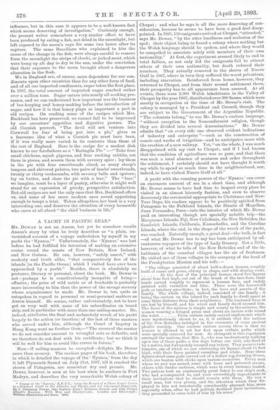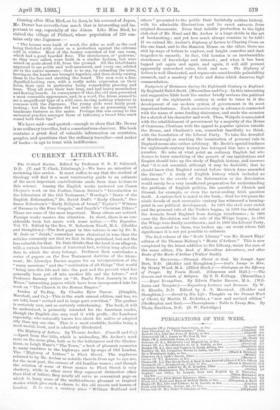A YACHT IN PACIFIC SEAS.* MR. DEWAR is not an
Anson, but yet he somehow recalls Anson's story by what he truly describes as "a plain, un- varnished account of a voyage undertaken by myself in my yacht the Nyanza." Unfortunately, the Nyanza' was lost before he bad fulfilled his intention of making an extensive cruise round the coasts of New Britain, New Ireland, and New Guinea. He can, however, "safely assert," with modesty and truth alike, " that comparatively few of the islands [in the Pacific Ocean] which I visited have ever been approached by a yacht." Besides, there is absolutely no pretence, literary or personal, about the book. Mr. Dewar is not—perhaps he is constitutionally incapable of being— effusive ; the price of wild cattle or of freeholds is probably more interesting to him than the power of the savage scenery whose acquaintance be made. Mr. Dewar is, too, quite as outspoken in regard to personal or semi-personal matters as Anson himself. He seems, rather unfortunately, not to have got on very well with some of his subordinates on board ship, and in particular with more than one sailing-master. He, indeed, attributes the final and melancholy wreck of his yacht largely to the action (or inaction) of the last of these masters who served under him, although the Court of Inquiry in Hong Kong went no further than,—" The errors of the master we do not consider amount to wrongful acts or defaults, and we therefore do not deal with his certificate ; but we think it will be well for him to avoid like errors in future."
Man—if sailing.masters be excepted—delights Mr. Dewar more than scenery. The earliest pages of his book, therefore, in which is detailed the voyage of the ' Nyanza,' from the day it left Plymouth Sound on July 21st, 1887, till it reached the shores of Patagonia, are somewhat dry and prosaic. Mr. Dewar, however, is seen at his best when he anchors in Port Madryn, and describes the very remarkable Welsh colony of • Voyage of the Nyanza,' R.N.Y.C.; being the Record of a Three Years' Cruise in a Schooner Yacht in the Atlantic and Pacific, and her subsequent Shipwreck. By J. Cumming Dewar, late Captain King's Dragoon Guards and 11th Prince Albert's Hussars, With Map and Illustrations. London and Edinburgh : William Blackwood and Sons. 1892. Chnpat ; and what he says is all the more deserving of con- sideration, because he seems to have been a good deal disap- pointed. In 1865, 150 emigrants arrived at Chupat, "attracted," says Mr. Dewar, " by the utter loneliness and seclusion of the spot; their object being to found a colony where nothing but the Welsh language should be spoken, and where they would be compelled to associate solely with members of their own nationality." At first, the experiment seemed likely to end in total failure, as not only did the emigrants fail to attract others of their own nationality, but death reduced their numbers. They actually removed to the shores of Nuevo Gulf in 1867, where in turn they suffered the worst privations, including starvation. Reinforced from home, however, they returned to Chupat, and from their second settlement there, their prosperity has to all appearance been assured. At all events, there were 2,300 Welsh inhabitants in the Valley of Chupat by the year 1887, distributed over 390 farms, which were mostly in occupation at the time of Mr. Dewar's visit. The colony is managed by a President and Council, though they are subject to the Government of the Argentine Republic.
" The colonists belong," to use Mr. Dewar's curious language, "without exception to the Nonconformist religion, though they are divided into several denominations." Mr. Dewar admits that "on every side one observed evident indications of industry and enterprise "—such as the construction of canals and works of irrigation—and he anticipates more with the erection of a new railway. Yet, " on the whole, I was much disappointed with my visit to Chupat; and if I had known that the condition of agriculture was so poor, and that there was such a total absence of neatness and order throughout the settlement, I certainly should not have thought it worth my while to spend so much time in the neighbourhood, nor, indeed, to have visited Nuevo Gulf at all."
A yacht with the running powers of the' Nyanza' can cover an enormous amount of sea in a short time, and although Mr. Dewar seems to have had time to inspect every place he visited in an almost leisurely fashion, and even to observe decorously the ceremonial appropriate to Christmas and New- Year Days, his readers appear to be positively spirited from Patagonia to the Falkland Islands, the Straits of Magellan, Juan Fernandez, Peru—into the interior of which Mr. Dewar paid an interesting though not specially notable trip—the Marquesas Islands, Fiji, New Caledonia, the New Hebrides, the Sandwich Islands, California, Kamschatka, and the Caroline Islands, where the end, in the shape of the wreck of the yacht, was reached. Naturally enough, a great deal—the bulk, in fact —of what Mr. Dewar has to say has been anticipated by ad- venturous voyagers of the type of Lady Brassey. Not a little, however, of what he tells of the New Hebrides and of the in- habitants of the cannibal villages has the air of freshness. He visited one of these villages in the company of the head of the Presbyterian Mission and his wife :— " The village consisted of about half-a-dozen houses, roughly built of canes and grass, oblong in shape, and with sloping roofs. At the door of the principal houses stood two figures about four feet high, cut out of the trunk of the tree-fern, their heads carved roughly to represent a human face, and rudely painted with vermilion and blue. These were the household gods or tutelary guardians ; in fact, the bares and penates of the family. The whole village, indeed, consisted of one family ; it being the custom on the island for each family to dwell apart at some little distance from their neighbours. The husband lives in one but by himself, and his wives and family dwell around him. The dress of the natives is simple and scanty in the extreme, the women wearing a fringed grass mat about six inches wide round the waist From certain rudely carved implements which were mysteriously shown to us, it is evident that the natives of the New Hebrides indulged in the remnants of some ancient phallic worship. One curious custom among them is that no woman is allowed to set her feet upon certain paths which were specially reserved for men. So stringent is this regulation amongst the natives, that Mrs. L., who was inadvertently walking upon one of these paths a few days before our visit, was fired at by a native, but fortunately escaped any injury. They possess rude temples, one of which we saw containing six figures about 15 feet high, with their faces painted vermilion and white. Near these figures stood some gods carved out of a hollow log, forming drums, which are beaten with sticks upon various occasions. Every man whom we met was armed, some with bows and poisoned arrows, others with Snider carbines, which were in every instance loaded. Two natives took an unpleasantly great fancy to our ship's cook, who had accompanied us, and were exceedingly importunate in their invitations that ho should remain with them. He was a small man, but very plump, and the attention which they dis- played to him not unnaturally considerably alarmed him, more
invitations,
they when, after ho had politely declined their nvitations,
they proceeded to seize hold cf him by his arms."
Coming after Miss Bird, as he does, in his account of Japan, Mr. Dewar has nevertheless much that is interesting and im- portant to say, especially of the Ainus. Like Miss Bird, he visited the village of Piritori, whose population of 220 con- tains only one Japanese :— ‘‘ The houses were built of wood, the sides as well as the roof being thatched with straw as a protection against the extreme cold in winter. Most of the houses consisted of but one room, which had a good boarded floor. The storehouses, or godawns,' as they were called, were built in a, similar fashion, but were raised on posts about 6 ft. from the ground. All the inhabitants appeared to me polite and well-mannered, and every ono saluted me in the native manner,—that is to say, by extending the arms, bowing as the hands are brought together, and then slowly raising them to the face and stroking the beard. The mon wore a fine, dignified-looking race, with a really noble expression on their faces, their eyes in particular being remarkably piercing and keen. They all wore their hair long, and had heavy moustaches and flowing beards. In consequence of this, the old men presented a most venerable appearance, and, in a word, the Ainus seemed to me a magnificent type of a wild race, having nothing whatever in common with the Japanese. The young girls were fairly good- looking ; but the females did not strike me as possessing such handsome features as the males. Perhaps this was owing to the universal practice amongst them of tattooing a broad blue mark round both their lips."
We have said—and quoted—enough to show that Mr. Dewar is no ordinary traveller, but a conscientious observer. His book contains a great deal of valuable information on countries, peoples, and questions that the ordinary traveller—and maker of books—is apt to treat with indifference.



















































 Previous page
Previous page